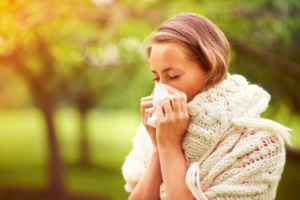
Season Change Sickness Symptoms: How to Prevent and Combat Them
October 3, 2024
As the time of year shifts, so too do many find that they start to feel rather unwell. Sudden changes in temperature and humidity combined with environmental conditions often take their toll on our bodies, which can easily be described as season change sickness symptoms. These may range from minor discomforts to severe ailments, and this is usually the most uncomfortable period for humans to keep up with their health.
It is during these times that nose congestions, coughing, and weariness, among other symptoms accompanying colds or flu-like diseases, are familiar occurrences. This situation gets worse, considering the fact that the immune system is overworking to cope with the changing conditions. While seasonal sickness might be an issue faced by plenty of people, knowing the causal explanations and symptoms can help in taking some cautious actions.
In this blog, we will explain why season change sickness symptoms occur, how to recognize them, and some of the ways available traditionally to avoid getting sick. We will also go into how modern solutions like mobile IV therapy can play a great role in helping you fight off seasonal sicknesses and stay healthy throughout the year.
Why Do People Fall Sick in Season Changes?

The change of seasons brings a lot of changes in weather as well as environmental conditions that make a number of people unwell. The symptoms of sickness due to a season’s change may vary from person to person, from fluctuation in temperature to increasing allergens. Knowing the reasons for the same will help you take correct measures for maintaining your health safety throughout the seasons’ changes.
Fluctuation in Temperature
Temperature change is another significant cause that leads to season change sickness symptoms. During most seasonal changes, the constant rising and fall of temperatures disrupt the normal body temperature regulation mechanism. This reduced immunity leaves one susceptible to colds, flu, and other upper respiratory infections. Hence, as the body gets acclimatized to the colder or warmer weather, the invading pathogens will find it tough to cause an illness.
Allergies and Immune Response
Other major players that promote symptoms of season change sickness include increased allergens such as pollen, dust, and mold. During certain seasons, namely spring and fall, more pollen and other allergens will be present that may trigger allergic reactions. If your body is fighting off allergens, your immune system might become compromised and diseases like the common cold become easier to set in. These seasons particularly disturb the allergic people, that invite respiratory complications as well as numerous other complaints.
Decreased Sunlight and Vitamin D Levels
Most seasonal transitions, particularly from summer into fall or winter, reduce the amount of sunlight. With reduced sunlight comes lesser production of Vitamin D, an important nutrient in the immune system. Lack of Vitamin D also contributes to the symptoms of sickness during season change because the body will have a reduced capacity to fight against infections. When sunlight is minimal, numerous individuals suffer from weakened immunity. This eventually makes them more prone to colds and other diseases.
Circulating Viruses
Viruses in circulation, such as the common cold and flu, appear to do well at a time when there is a change of seasons. Due to colder months, people are more likely to be indoors and, therefore, in closer contact with other people, which increases the chance of transmission of viruses. These viruses are highly communicative, especially in closed areas, hence the rise of symptoms for sickness caused by a change of season. These are the times when immunity in one’s body is at its lowest ebb, and the viruses circulate more freely, thus it becomes easier for the illnesses to be passed on from person to person.
Common Symptoms of Seasonal Sickness

Being able to recognize the sickness symptoms of a season change can help you act sooner in trying to feel better. Though symptoms may vary in every person and according to the seasons, there are a few common signs you need to look out for when seasons change.
Runny Nose and Congestion
Symptoms of sickness for seasonal change include a runny or stuffy nose, which is usually brought about by the combined effect of cold air allergens and viruses, which work together to irritate the nasal passages and increase congestion.
Coughing and Sore Throat
Coughing and sore throats are other common symptoms of sickness one may go through during the time of seasonal change. The dry air and respiratory infections cause irritation in the throat, causing nagging cough or soreness in it.
Fatigue and Weakness
The seasonal sickness can leave you tired or weak by sapping your energy. This symptom is the most common result of an over-working mechanism of the immune system to combat invading infections or allergens.
Body Aches
The symptoms of a seasonal illness always include general body aches and muscle pain. Your body reacts to infection or changes in temperature, which can create discomfort in your joints and muscles.
Fever or Chills
Fever or chills may also be symptoms of sickness related to the change of seasons, especially in cold seasons. These signs and symptoms occur when the body rises its internal temperature to fight off viruses or bacteria.
Headaches
Headaches can directly be caused by the sudden changes in weather, sinus congestion, or dehydrating factors common during seasonal shifts. These headaches can range from mild to severe headaches.
Worsening Allergies (Sneezing, Itchy Eyes, etc.)
Seasonal transitions tend to bring out the worst in individuals suffering from allergies. Sneezing, itchy eyes, and nasal congestion worsen during those times of the year when allergens such as pollen, dust, and mold are highly present in the air. Seasonal transitions may be challenging because the symptoms of season change sickness are not easy to bear; however, it is knowing why they happen and recognizing the symptoms early which will help one take the right steps toward feeling better.
Traditional Ways to Avoid Falling Sick
During seasonal changes, a lot of people end up developing season change sickness symptoms. However, there are many ways using which you can reduce the chances of falling sick with these traditional methods. You can protect your body from seasonal sickness by strengthening your immune system and keeping good health habits. This will make it more resistant to seasonal sickness.
Boosting Immunity with Vitamins
The best way of fighting the symptoms of sickness due to seasonal change is buckling up your immune system with the help of essential vitamins. Vitamins like Vitamin C, Vitamin D, and Zinc are known for their immunity-boosting properties.
- Vitamin C helps in the production of white blood cells, which are the main key to fighting infection.
- Vitamin D regulates the immune response; it makes any particular individual more prone to diseases if deficient, mainly during those months when the sun is hidden.
- Zinc is required for appropriate function and mechanisms of immune cells and is involved in reducing cold severity and duration .
- All these supplements, when taken on time with the change of time and seasons, will help strengthen your immune system against seasonal illnesses.
Hydrate
Hydration is another important factor that can help a person evade seasonal change sickness symptoms. Drinking plenty of fluids will keep your body hydrated, hence providing an optimal avenue for your immune system to work well. When you are well hydrated, your body can easily clear out toxins and keep your mucous membranes moist to act as a barrier to viruses and bacteria. Water, herbal teas, and electrolyte-loaded drinks will be excellent fluids that can help you keep your hydration levels up, particularly during seasonal changes.
Get Enough Sleep
Good sleep is one of the most important immune-boosting strategies. Your body manufactures cytokines while you sleep. Cytokines are proteins which specifically attack infection and inflammation. With lack of sleep, your body gets less able to fight the symptoms of seasonal sickness, and your chances of catching a cold, flu, or other seasonal viruses increase. Some of the easiest and effective ways to prevent sickness include getting 7-9 hours of restful sleep every night. This means one should not, for example, sleep very late during weekends or grossly disrupt routines.
Wash Hands Often
One of the simplest yet vital habits to help prevent symptoms of sickness due to seasonal changes is washing your hands often. Germs causing seasonal sickness may spread through direct contact with infected surfaces or individuals. Handwashing with soap and water for at least 20 seconds can remove much of the bacteria and viruses that cause illness from your skin. When soap and water are not available, an alcohol-based hand sanitizer with at least 60% alcohol can be effective.
Avoiding Contact with Sick People
Another important measure to avoid symptoms of seasonal change sickness is to limit contact with individuals who show signs of sickness. It is no doubt that viruses like flu and the common cold are contagious, hence they might spread quickly in places where people are in close contact with one another. The moment you have an idea that someone around you is apparently sick, try limiting close contact with them, maintain a reasonable distance from such a person, and wash your hands as frequently as possible. These precautions will help a great deal in lessening your vulnerability to seasonal sickness. Accompanying these traditional methods into your routine will help you to dodge symptoms of season change sickness and keep you healthier while the transition of seasons is taking place.
How Mobile IV Therapy Can Help Combat Seasonal Sickness

When symptoms of sickness due to season change appear, mobile IV therapy represents an innovative and functional countermeasure against seasonal illness. It immediately rehydrates and provides nutrients to the bloodstream for rapid relief, and it also strengthens the immune system-pretty nice equipping for fighting off discomfort caused by seasonal change.
On-the-Spot Hydration and Nutrient Replenishment
One of the major benefits of mobile IV therapy is the capability to immediately rehydrate and replenish with nutrients. Poor hydration and intake of essential vitamins are responsible for various symptoms of season change sickness, which includes fatigue, headache, and body ache. IV therapy works by delivering fluids and vital nutrients like Vitamin C, B-Complex, and Zinc directly into the bloodstream, bypassing digestion entirely for quick absorption. This is helpful for boosting the immune system and providing your body with the nutritional requirement to fight off the sickness as quickly as possible.
Customized Immune Support Treatment
Mobile IV therapy helps in customizing treatments according to your needs for immune support. Treatments like Uplifted Meyers or Uplifted Immunity drip using IV is meant for strengthening an individual’s immune system, which generally gets challenged with seasons of change. These drips involve strong components, including Vitamin C, Magnesium, and B-Complex, to help the body ward off symptoms from colds, flu, and other common seasonal illnesses that are associated with seasonal transitions. By personalizing a treatment, you are assured of getting exactly what is needed from the vitamins and nutrients to keep at bay any symptoms of an illness caused by a season change.
Fast Symptom Relief
For those already suffering from sickness due to the change in seasons, mobile IV therapy provides immediate care. Hydration and nutrients from the IV drip will soothe lethargy, headaches, body aches, and congestion. This treatment replenishes fluids inside your body and injects immune-boosting ingredients into your blood stream to accelerate recovery so you can get back to your daily schedule feeling refreshed.
Convenience of Mobile Treatment
One of the many great advantages of mobile IV therapy is that it is convenient. Rather than be compelled to visit a clinic, mobile IV services will come to your preferred location, be it in the comfort of your home, office, or wherever else you may feel fit. This becomes particularly important as the changing of seasons arrives and people have a tendency to get sick but probably would not have the patience or energy to go out for treatment. With mobile IV therapy, treatments are fast and highly effective without having to leave your space-a great solution for busy individuals trying to stay healthy during seasonal changes. Schedule a consultation with Uplift IV Wellness today!